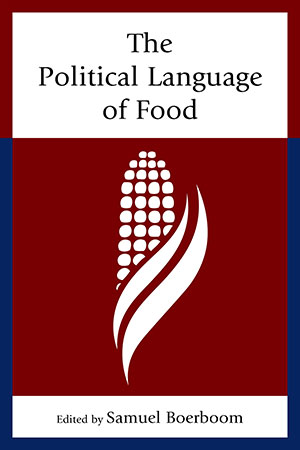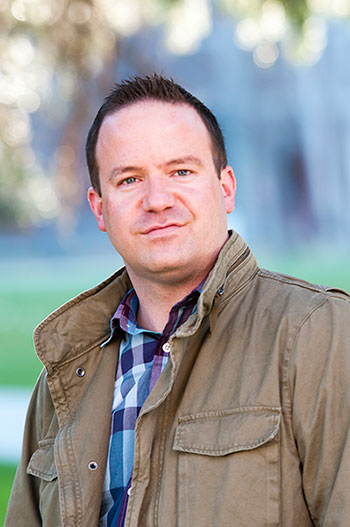University Communications and Marketing
MSUB professor’s new book focuses on the political language of food
November 24, 2015
Contacts:
Dr. Sam Boerboom, 657-2962
Carmen Price, University Communications and Marketing, 657-2266
Dr. Sam Boerboom, assistant professor of media studies
The ‘Political Language of Food’ was published by Lexington Books, an imprint of the Rowman & Littlefield Publishing Group, Inc.
MSU BILLINGS NEWS SERVICES — Organic. Free-Range. Local. All-natural. Gluten-free. Lactose-free. Non-GMO.
We are all witness to the bounty of fierce competition for our food dollars in advertising and on supermarket shelves, faced with an abundance of superlatives and adjectives that can make food-buying decisions, well… convoluted.
 Sam Boerboom, assistant professor of media studies in the Department of Communication
and Theatre at MSU Billings, investigates in his recently published book, “The Political
Language of Food,” why the language used in the production, marketing, selling and
consumption of food is inherently political.
Sam Boerboom, assistant professor of media studies in the Department of Communication
and Theatre at MSU Billings, investigates in his recently published book, “The Political
Language of Food,” why the language used in the production, marketing, selling and
consumption of food is inherently political.
In the book’s introduction, Boerboom points to George Orwell’s landmark essay “Politics and the English Language,” where rhetorical style is eloquently linked with politics and power.
Food language is rarely neutral and is often strategically vague, which tends to serve the interests of powerful entities, he said.
And, like manufacturing cigarettes or pharmaceuticals, making food is very big business.
“It’s not that we are always fooled, but we are up against language that is not always clear and is often misleading,” Boerboom said.
Boerboom and the book’s contributing writers, including MSUB assistant professor Melissa Boehm, critique the intersection of food and language through an examination of idioms, tropes, euphemisms and invented terms that function to both mislead and obscure relationships between food and the resulting community, health, labor and environmental impacts.
“The language of food conceals just as much as it reveals,” Boerboom said. “Often, the narrative replaces facts.”
The book offers a multitude of methodological approaches to topics such as back-to-the-land food movements, social divisions, culinary slumming and the greenwashing of food discourse.
In the book’s review, Carlnita P. Greene of University of Oregon says the book—published by Lexington Books—is a “comprehensive collection of essays with a variety of foci and approaches, which all reinforce the central tenet that if we truly want to understand how food functions politically, socially, culturally and materially, we must begin by examining the murky depths of language, by dissecting the very words that we use to discuss it, and by interrogating the key meanings surrounding it.”
In a country whose love of labels and branding is no secret, corporations use buzzwords known as “greenwashing” that overly hypes food discourse, encouraging the consumption of food sutured to positive, yet ambiguous, environmental messages such as “sustainable,” “Non-GMO,” and “gluten-free.”
“We are accustomed to and inundated with marketing language,” he said. “It creates a halo-effect, and it works magnificently.”
Boerboom said the aim of the book is to empower consumers to be more informed about the political language of food.
“My hope is for consumers to be vigilant, and scrutinize labels. This, in turn, will compel producers to be more transparent. It’s not a zero sum. We can all benefit.”
Boerboom, who is in his third year teaching at MSUB, earned his Ph.D. in 2010 from the University of Minnesota. There, his research concentrated on the effects of language and rhetorical studies. His research interests include political communication, rhetorical theory, mobile media and media ecology.
His work has appeared in the Journal of Mass Media Ethics, Journal of Mobile Media and Communication, Sage’s Encyclopedia of Mobile Media and Politics as well as in various scholarly anthologies. He is presently researching rhetorics of Neoluddism.
MSU Billings Spring Lecture Series features topics of food culture, politics and history
In the Spring, the MSU Billings Library will host a lecture series called “What’s Cooking?: Exploring American Food Culture, Politics, and History” beginning in March where Boerboom will present on the political language of food.
Other featured speakers include Boehm of the Communication Department; Matt Queen of the Biological and Physical Sciences Department; Seabring Davis, author and editor of Big Sky Journal; Reno Charette of the Office of American Indian Outreach; and Emily Arendt of the History Department.
All lectures are held Tuesday evenings at 6:30 p.m. in the library building, room 148. The series is free and open to the public.
March 15, 2016: Dr Sam Boerboom, MSU Billings Communication Department
"Americans at the Table: The Political Language of Food"
March 22, 2015: Dr. Melissa Boehm, MSU Billings Communication Department
"Pungent but Problematic: Media and Food Culture"
March 29, 2016: Dr. Matt Queen, MSU Billings Biological & Physical Sciences Department
"Chemistry on Your Plate"
April 5, 2016: Seabring Davis, Author, Editor of Big Sky Journal
"A Taste of Montana"
April 12, 2016: Reno Charette, MSUB Director of American Indian Outreach
"Native Foods"
April 19, 2016: Dr. Emily Arendt, MSU Billings History Department
"Partisan Food Fights: Cuisine and Politics in American History"

